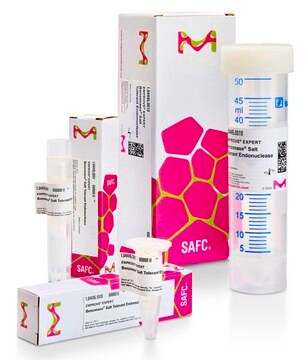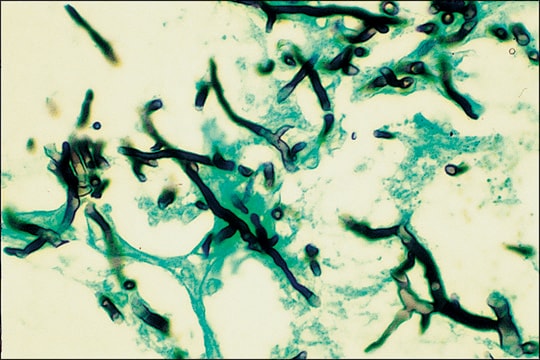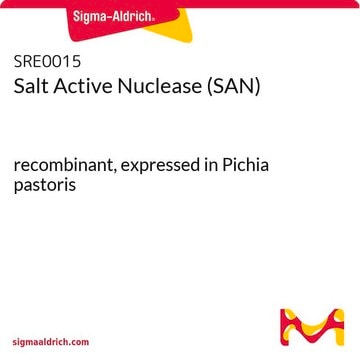1.01697
Benzonase® endonuclease
EMPROVE® EXPERT
Pharma Manufacturing
Synonym(s):
Endonuclease from Serratia marcescens
About This Item
Recommended Products
biological source
Serratia marcescens
Quality Level
recombinant
expressed in E. coli
description
suitable for biopharmaceutical production EMPROVE® bio
product line
EMPROVE® EXPERT
Assay
≥99% (SDS-PAGE)
form
buffered aqueous glycerol solution
concentration
≥250 units/μL
pH
8.0 (25 °C in H2O)
application(s)
pharma/biopharma processes
shipped in
dry ice
storage temp.
-10 to -25°C
Looking for similar products? Visit Product Comparison Guide
General description
Benzonase® endonuclease is the smart solution for DNA removal in viral vaccine and viral vector production and has proven its value for over 30 years. Balancing efficiency and regulatory compliance by delivering reliability and high-quality due manufacturing under good manufacturing practices (GMP ICH Q7). Our extensive documentation packages of Emprove® dossiers and the availability of a FDA Drug Master File type II, supports you in filing your vaccine manufacturing process to the authorities.
M-Clarity Program
As part of our EMPROVE® Program, our raw materials are offered with EMPROVE® Dossiers which provide comprehensive, up-to-date documentation to help you navigate regulatory challenges, manage risks, and improve your manufacturing processes.
Our comprehensive portfolio of downstream process chemicals not only provides biopharmaceutical manufacturers with high-quality raw materials for production of classical and novel therapies, but also helps them get to market faster and simplify regulatory challenges. Ranging from non-GMP grades for low-risk application, to IPEC-PQG GMP for higher-risk applications, we have products covering all your manufacturing needs.
Application
Biochem/physiol Actions
Analysis Note
Appearance (color): colourless
Activity (DNA; pH 8.0; 30 min; 37 °C): ≥ 250 U/µl
Spec. activity (calc. on protein): ≥ 1.1E+06 U/mg
Identity (electrophoresis): passes test
Purity (calc. on protein): ≥ 99.0%
Proteases: not detectable
Colony count (aerobic bacteria): <10 CFU in 100 000 U
Colony count (Yeasts and moulds): <10 CFU in 100 000 U
Endotoxines (LAL-test): <0.25 EU in 1000 U
Legal Information
also commonly purchased with this product
related product
Storage Class Code
10 - Combustible liquids
WGK
WGK 1
Certificates of Analysis (COA)
Search for Certificates of Analysis (COA) by entering the products Lot/Batch Number. Lot and Batch Numbers can be found on a product’s label following the words ‘Lot’ or ‘Batch’.
Already Own This Product?
Find documentation for the products that you have recently purchased in the Document Library.
Customers Also Viewed
Articles
This page describes key considerations for cell lysis and how the combination of a high salt concentration and a salt tolerant endonuclease can be used to increase vector titer and infectivity during AAV vector manufacturing.
This page describes key considerations for cell lysis and how the combination of a high salt concentration and a salt tolerant endonuclease can be used to increase vector titer and infectivity during AAV vector manufacturing.
This page describes key considerations for cell lysis and how the combination of a high salt concentration and a salt tolerant endonuclease can be used to increase vector titer and infectivity during AAV vector manufacturing.
This page describes key considerations for cell lysis and how the combination of a high salt concentration and a salt tolerant endonuclease can be used to increase vector titer and infectivity during AAV vector manufacturing.
Our team of scientists has experience in all areas of research including Life Science, Material Science, Chemical Synthesis, Chromatography, Analytical and many others.
Contact Technical Service







